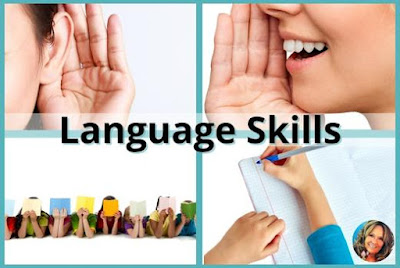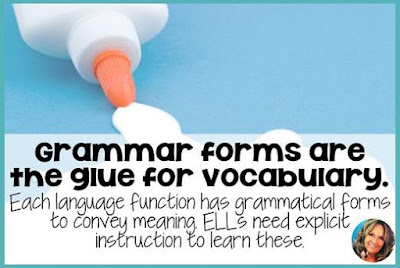Here you are, ready to be an amazing ESL teacher this year for the English Language Learners in your classroom!
This is the third in a three-part series focusing on teaching English Language Learners. This post is filled with tips for ESL teachers to help your ELLs with writing and grammar skills!
Check out part 1 focusing on listening and speaking skills and part 2 about reading skills for a wide variety of ideas and activities with tips for ESL teachers.
A quick review of language skills for teaching ELLs
The four basic language skills are listening, speaking, reading, and writing, with many teachers also including grammar as a fifth. I agree!
Educational achievement for ELLs requires proficiency in all five skills so these basic language skills are must-haves! But often must-haves aren’t the most fun but you’re in luck because this post suggests activities and games for your daily lessons to incorporate some or all of the skills to build fluency and language competency. This combination is the key to academic success for the English Language Learners in your classroom.
Keep reading about how to teach writing and grammar skills with this post filled with tips for ESL teachers! Plus, you can grab your own bundles with these lessons and more for not just writing and grammar but all language skills for newcomers, intermediate, or advanced ELLs!
Writing Skills
Building writing skills require amazing ESL teachers to teach and practice writing skills with their students.
Writing skills are the graphic aspect of a language and starts with the ability to write basic phrases. ELLs start by writing phrases and sentences using basic verbs. As language increases so does writing. ELLs continue by writing sentences using past tense, perfect and progressive tenses including conjunctions and more descriptive adjectives. Finally, at early advanced levels we see ELLs writing complex paragraphs and essays filled with sophisticated vocabulary, idioms and figurative writing, complex sentences, and using appropriate voice.
Get your full-year curriculum bundle with these lessons and more! Save time with ready-made lessons, activities, and games to help the English Language Learners in your classroom.
Graphic organizers, word walls, and sentence frames are great scaffolds for ELLs as they increase their writing abilities.
Many times, ELLs do not know the correct way to write their thoughts. Guide students as they revise their writing. Start with smaller writing assignments so students don’t become overwhelmed. Sentence starters are great motivators for ELLS.
Write every day. Model for your students. Use think alouds while you write. Model how to edit and revise. Give sufficient time for revising. Note any repeated writing errors to add as an informal mini lesson. Remember
I do it
We do it
You do it
Teaching writing skills can be FUN! Here are a few ideas.
Build on a random sentence
Write a story, poem, or song
Have students complete a story you started
Retell a favorite or family story
Watch a short fun video and have students write about what happened using the strategy: Somebody… Wanted… But… So… Then…
Story of their life
Grammar skills
Building grammar skills requires amazing ESL teachers to teach and practice grammar with their students.
Grammar forms are the glue for vocabulary. Each language function has grammatical forms that convey the meaning for that function. ELLs need explicit instruction to learn the grammar that goes with these forms. All parts of speech can be broken down by grade level. Teaching the appropriate grammar for each language level and grade level of your students. Click here for an ELD matrix by Susana Dutro.
Her ELD Matrix of Grammatical Forms is filled with tips for ESL teachers because it shows which parts of speech should be taught at each language level. Beginners to Early Advanced need a grammar foundation that increases with each language level they attain.
Board games: practice any grammar you teach with dice and a game board
Spot the mistakes: make up cards with 2 correct sentences and one grammar goof.
Tell it table
Sort parts of speech
Parts of speech game show
Congratulations you are on your way to becoming an amazing ESL teacher this year. I hope you found some educational nuggets within this three-part series that you can use this year with your ELLs! And, if you want to be amazing without worrying about planning, check out these bundles whether you have newcomers, intermediate, or advanced ELLs!
Make sure to read part 1 about listening and speaking and part 2 about reading.
Be Bold!
Be Great!
Be Amazing!
Your partner in ESL!
Lori






No comments:
Post a Comment